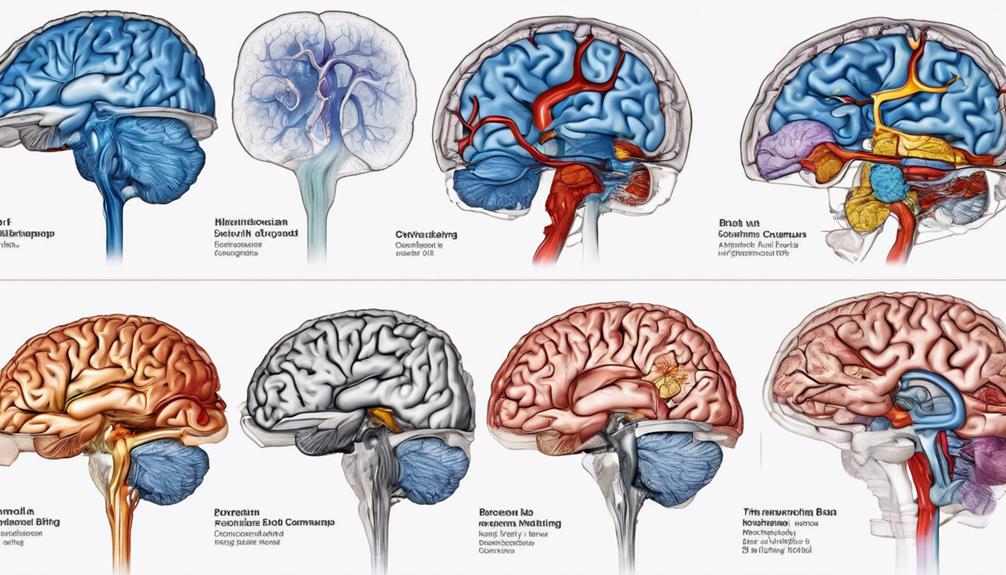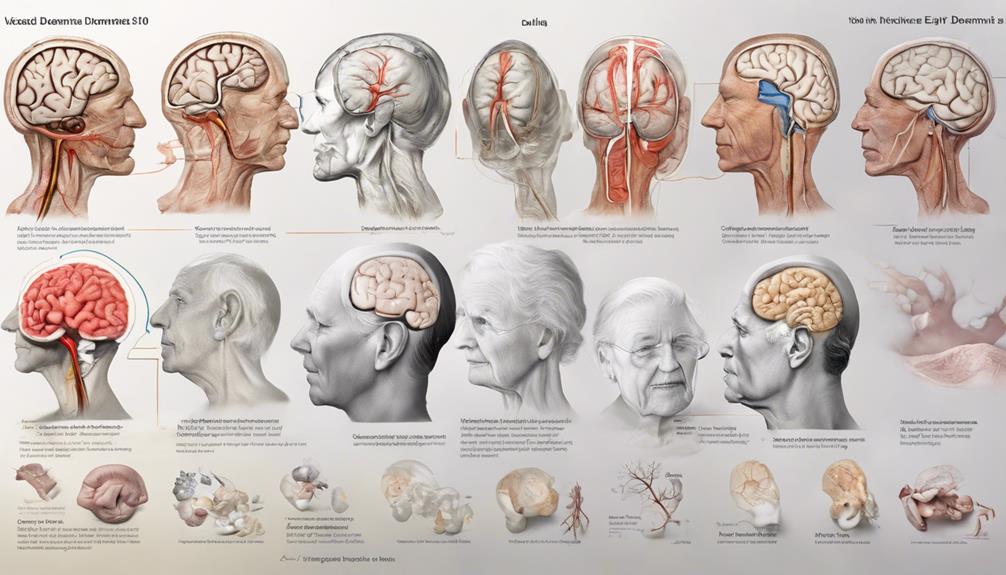Have you ever thought about how the various stages of vascular dementia are linked to the gradual decrease in cognitive functions? Recognizing the sequence in which these phases occur can offer important insights into the advancement of the illness and the required caregiving support.
By exploring the nuanced changes that occur from early symptoms to advanced cognitive impairment, we can gain a deeper understanding of how individuals with vascular dementia experience and navigate their journey through this complex condition.
Key Takeaways
- Early identification crucial for tailored interventions.
- Transition to moderate decline requires professional care.
- Severe cognitive impairment needs continuous monitoring and specialized interventions.
- Advanced stages require around-the-clock supervision and focus on comfort and communication.
Understanding Vascular Dementia Progression
In understanding the progression of vascular dementia, it's essential to recognize the categorization of its stages from normal behavior to severe cognitive decline. Vascular dementia progresses through seven stages, starting with normal behavior, moving through mild cognitive decline, moderate decline, and eventually reaching severe cognitive decline.
Each stage is characterized by specific symptoms that evolve gradually, affecting memory, decision-making abilities, and daily functioning as the disease advances. Care requirements also vary at each stage, necessitating tailored interventions to manage symptoms effectively and maintain the individual's quality of life.
Understanding these stages is crucial for healthcare providers and caregivers to provide appropriate support and assistance throughout the progression of vascular dementia. By identifying the specific stage a person is in, caregivers can customize care plans to address the evolving needs and challenges associated with each stage of the disease.
Identifying Early Cognitive Changes

Identifying early cognitive changes in vascular dementia typically involves recognizing subtle memory lapses or increased confusion noticed by family members and close contacts. During this stage of mild cognitive decline, individuals may experience mild forgetfulness and occasional confusion, which can impact daily functioning.
These changes may manifest as difficulty with problem-solving or remembering recent events, leading to potential misunderstandings or frustrations. It's crucial to differentiate these symptoms from normal aging processes, as impaired blood flow to the brain in vascular dementia usually underlies these cognitive impairments.
Seeking a diagnosis and intervention early on is essential, as family members and close contacts are often the first to observe these initial signs. Understanding the stages of vascular dementia and being vigilant for these subtle changes can help in prompt recognition and management of the condition.
Transitioning to Moderate Decline
As individuals progress into the stage of moderate decline in vascular dementia, daily tasks start to present increasing challenges. Symptoms such as memory difficulties and confusion become more pronounced, making it harder for individuals to remember important information or follow conversations.
Safety concerns also heighten during this phase due to the cognitive decline experienced in moderate dementia, leading to potential risks in managing medications or using household appliances. Changes in mood, like increased irritability or apathy, along with social withdrawal, may further impact the individual's daily interactions and quality of life.
At this stage, professional care and support become increasingly necessary to assist with the declining cognitive abilities and help manage the challenges of moderate dementia. It's essential to provide a safe environment and tailored assistance to support individuals in maintaining their independence while navigating the complexities of daily tasks amidst the progression of vascular dementia.
Navigating Severe Cognitive Impairment

Entering the phase of severe cognitive impairment in vascular dementia signifies a significant escalation in memory loss and confusion, necessitating extensive support for individuals facing challenges with basic daily activities. During this stage, loved ones caring for individuals with vascular dementia may encounter various difficulties that require specialized attention:
- Communication Difficulties: Individuals may struggle to express themselves coherently or understand verbal cues, making communication challenging.
- Personality Changes: Shifts in behavior and personality traits can occur, leading to unpredictable emotions and responses.
- Supervision: Continuous monitoring and supervision become crucial to ensure the safety and well-being of individuals with severe cognitive impairment.
- Challenging Behaviors: Agitation, aggression, or wandering tendencies may manifest, necessitating strategies to manage and address these behaviors effectively.
In this phase, maintaining quality of life is paramount. Implementing interventions like music therapy and establishing familiar routines can help enhance comfort and well-being for individuals navigating severe cognitive impairment in vascular dementia.
Coping With Advanced Disease Challenges
Navigating the challenges presented by advanced vascular dementia involves implementing specialized care strategies to address severe cognitive decline and behavioral changes effectively. In the advanced stages, individuals may experience severe cognitive decline, significant personality changes, and behavioral challenges, necessitating around-the-clock supervision and tailored support. Communication strategies, such as using nonverbal cues and familiar items, play a vital role in managing these advanced disease challenges. Caregivers should focus on managing pain, promoting comfort, and ensuring a high quality of life for individuals with advanced vascular dementia. Coping strategies should prioritize the individual's well-being and aim to enhance their overall comfort and quality of life. By providing dedicated care and attention, caregivers can help individuals navigate the complexities of advanced vascular dementia with compassion and understanding.
| Coping Strategies | Description |
|---|---|
| Around-the-Clock Supervision | Providing continuous support and monitoring for individuals with advanced vascular dementia. |
| Communication Strategies | Using nonverbal cues and familiar items to effectively communicate with individuals in need. |
| Managing Pain | Addressing and alleviating physical discomfort and pain experienced by individuals in advanced stages. |
| Promoting Comfort | Creating a safe and comfortable environment to enhance the well-being of individuals with advanced vascular dementia. |
Frequently Asked Questions
What Are the 7 Stages of Vascular Dementia?
We can explain the stages of vascular dementia broadly as follows:
- From normal behavior with no symptoms to mild changes such as memory loss and confusion.
- Progressing to mild cognitive decline with noticeable memory difficulties.
- Then, a moderate decline follows where daily tasks become challenging.
- Finally, there's a moderately severe cognitive decline affecting all areas of life.
These stages help in understanding the progression of vascular dementia.
How Quickly Do You Deteriorate With Vascular Dementia?
We may deteriorate at varying rates with vascular dementia, as progression differs among individuals. Some may experience rapid decline, while others deteriorate more slowly.
It's essential to monitor symptoms closely and provide appropriate support as needed. Understanding these differences can help tailor care effectively, ensuring individuals receive the necessary assistance throughout the different stages of the disease.
What Are the Signs That Vascular Dementia Is Getting Worse?
As signs that vascular dementia is worsening, we notice increased memory loss, difficulty with daily tasks, behavioral changes like agitation, worsening mobility and coordination issues, and greater reliance on caregivers.
These symptoms indicate progression and a need for increased support and supervision.
Monitoring these changes is crucial to ensure appropriate care and interventions are in place to manage the disease effectively.
What Stage of Vascular Dementia Does Sundowning Start?
Sundowning typically begins in the moderately severe cognitive decline stage of vascular dementia. It manifests as increased confusion, agitation, and restlessness in the late afternoon or evening. The symptoms of sundowning can worsen as dementia progresses, often becoming more pronounced.
Environmental factors like low light levels can trigger or exacerbate sundowning behaviors. Managing sundowning involves establishing a calming routine, ensuring safety, and addressing any underlying triggers.
Conclusion
As we witness the gradual decline in cognitive function and physical abilities in individuals with vascular dementia, we must also recognize the resilience and strength they demonstrate in facing these challenges.
By understanding the stages outlined in the chart and providing appropriate care interventions, we can support their quality of life and well-being throughout the progression of the disease.
It's a delicate balance between acceptance of the reality and the determination to provide compassionate care.









